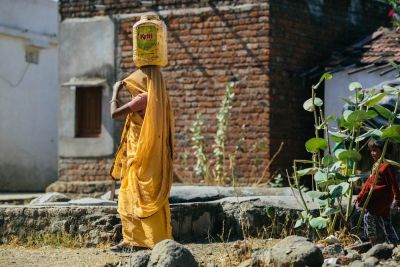On Super Bowl, remember dark tradition of girls groomed by parents for sex

There are nearly 25 million victims of human trafficking worldwide, and 99% of them are women and young girls who are often trafficked specifically for sexual exploitation. Large sporting events, like the upcoming Super Bowl, are notoriously known for big crowds and party atmospheres that leave host cities more susceptible to sex trafficking.
But thousands of miles from this year’s host city of Phoenix, men, women, and children are living in India’s Banchara community where sex trafficking isn’t just an increased concern until a one-time sporting event is over. It’s a year-round way of life that wreaks havoc and devastation for those living in it.
When I visited the Banchara community in India, one of the first things I noticed was the cots placed outside the houses. Embroidered pillows with deep shades of maroon and flashy gold draw the eye toward them. Some have flower petals littered over the top.
These cots are symbols of a dark family business. They signify that inside the home, a young girl was groomed and forced into sex work. When she is sitting on the cot, she is open for business.
In places like Thailand and India, these girls begin their careers as sex workers as young as 12 years old. The Banchara community calls the practice of placing your eldest daughter in the sex trade “Nari Mata.” This tradition began over 500 years ago, and the custom still has a tight grip on the community today.
When a girl is born, her entire life is decided for her. Mothers begin grooming their daughters at a young age to become sex workers. One mother from India shared with me: “I wanted to make her look pretty. Why shouldn’t I do it? My mother did it for my elder sister when she turned 12 years old. Now it is my turn because Neetu is the oldest among my three daughters. It is my duty to get her prepared for her new life.”
Once the child is deemed old enough, her father holds a special ceremony to announce her entry into the sex industry, often with her first customer waiting inside the family home.
Brothers even help fathers pimp out their sisters, knowing the money will go toward their dowries.
And while this tradition started with impacting only the eldest daughter in each family, it has now evolved into impacting nearly all of the girls in these communities.
I’ll never forget one of the first times I saw the impact of his horrifying tradition with my own eyes.
Several years ago, I met a teenage girl in the Banchara community. I’ll call her Pushana to protect her privacy. As the oldest daughter in her family, Pushana was solely responsible for paying off her three brothers’ marriage dowries by working in the sex industry. The amount she owed? Nearly $10,000 — plus interest.
I left heartbroken after speaking with her, knowing that she will likely spend most of her life paying off a debt that isn’t even hers.
Pushana was determined to make sure her young daughter would never be forced into the sex industry like she was — but she was the exception. “Nari mata” has been around for so long that many girls don’t recognize what’s really happening to them. It’s just the way things are done. It has been a daughter’s duty to provide for the family for generations, and parents rely on them to help care for the other children.
These girls are trapped in culturally accepted sexual slavery — and they can’t marry or receive an education once they start working.
When it comes to major sporting events like the Super Bowl, human trafficking is thought to be so pervasive that safety measures are put into place far in advance. Local law enforcement agencies join together to apprehend traffickers and to provide victim support. But girls in the Banchara community have no such protection.
Traffickers who prey on girls when cities are flooded with sports fans work in secret — hiding in plain sight and isolating victims from their friends, families, and communities.
“Nari mata,” on the other hand, is clearly visible to the outside world, yet few people have ever heard of it. And instead of its victims being isolated from their families, it is their families who push them into it.
But rescuing or preventing just one girl from entering the sex industry is a disruptor that can completely shatter the Banchara’s tradition of slavery and restore lives.
Our partners in India have shared with me countless times how something as simple as receiving an education changes a woman’s life in the Banchara community. The roots of culturally accepted sexual slavery may be strong, but when these steps are taken, a transformation begins that will last for generations.
By providing for their critical needs at facilities called Freedom Homes — a safe place to live, counseling, education, medical care, and more — World Help is helping young girls experience freedom while providing long-term care and rehabilitation.
There’s no better time to help a girl experience freedom than the present. We can all play a part in raising awareness about this critical issue. Sex trafficking deserves this kind of attention every day — not just around major sporting events like the Super Bowl.
Noel Brewer Yeatts is the president of World Help, a Christian humanitarian organization serving the physical and spiritual needs of people around the globe. Research for this piece is provided by Megan Stoia.



























